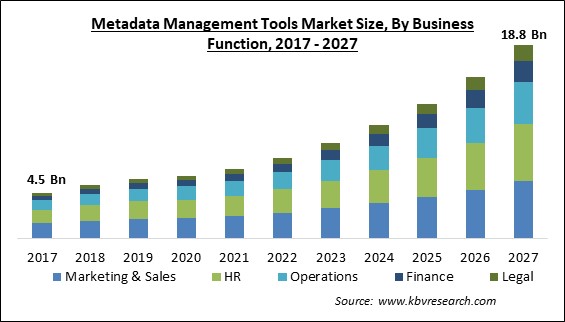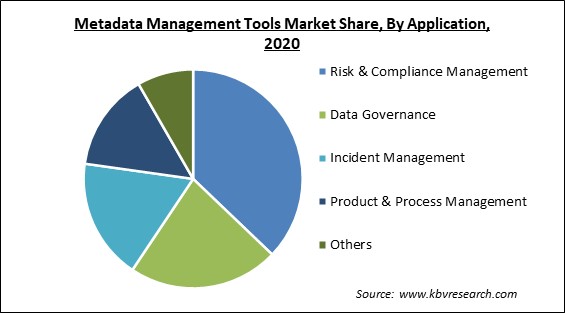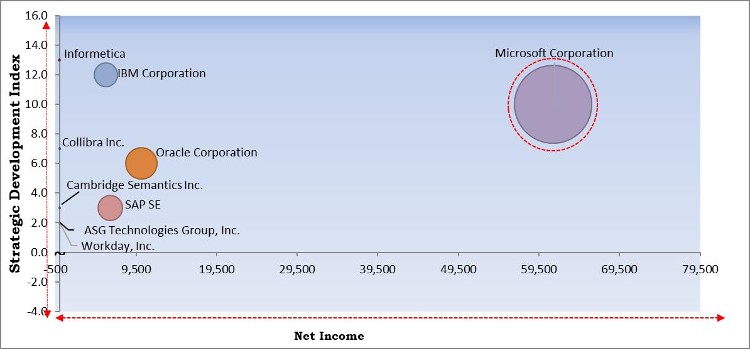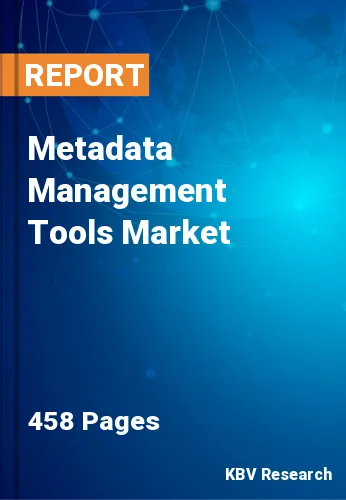The Global Metadata Management Tools Market size is expected to reach $18.8 billion by 2027, rising at a market growth of 18.6% CAGR during the forecast period.
Metadata management refers to a cross-organizational agreement on the description of informational assets for the purpose of turning data into an enterprise asset. Metadata management becomes even more important as volumes and diversity of a data expand, making it possible to draw commercial value from significant amounts of data. The first step in managing metadata is to define it appropriately. Various people define metadata as "data about data, which is one of the most basic definitions of it. Metadata is also sometimes referred as a solution that identifies data.
The administration of an organization's data and information resources is referred as metadata management. The numerous aspects of an information asset that can increase its usability during its life cycle are known as metadata. Enterprise metadata management (EMM) refers to the responsibilities, roles, processes, organization, and technology required to ensure that metadata throughout the organization provides value to the data. EMM differs from metadata management in that it works across all programs, projects, and initiatives, whereas metadata management only works at the level of an individual program, project, or initiative.
Metadata is considerably more than just a description of data in practice. Every day, metadata takes on new functions as data complexity grows. Metadata can be about the business viewpoint of quarterly sales in some circumstances. In other circumstances, it may refer to the data warehouse's source-to-target mappings. Metadata management is vital because it allows the customers to use metadata to better analyze, aggregate, categories, and sort data. Many data quality issues can also be traced back to metadata. Quality metadata facilitates the day-to-day tasks of a person. For example, it facilitates tasks, like internal communications as well as designing new apps to make smarter decisions.
The speed with which enterprises are adopting the data culture is driving the present requirement for metadata management. It generates tremendous volumes of data as well as consumes substantial amounts of it. Metadata management provides both the scenarios of which data to generate and which data to consume, a clear and rich context, ensuring that data coverts to a useful organizational asset.

The COVID-19 pandemic caused a major downfall to the worldwide economy. All of the businesses and industries were temporarily shut, which led to a shortage of various goods. In addition, governments all over the world were forced to impose country-level lockdowns in order to regulate the spread of the infection. These lockdowns caused a disruption in the supply chain of various goods and services. The COVID-19 outbreak has had an impact on trade across the globe. It also had a moderate effect on the IT sector as a whole. In the IT industry, the hardware company is one of the most impacted industries.
Moreover, the growth of IT infrastructure has slowed due to a decrease in hardware supply as well as reduced manufacturing capacity. Businesses that provide solutions and services were also disrupted due to the advent of the coronavirus infection.
Enterprises generate massive amount of organized and unstructured data, necessitating the use of data analytics software. By altering the ability to respond to an opportunity or restrict a loss when a change occurs, centralized data management contributes to the enterprise's total surplus. The level of data centralization inside a company can have an impact on its productivity and innovation. The concept of centralized data management offers up a world of possibilities for a business in a competitive market. Metadata management tools improve enterprise dataset handling agility and efficiency, speed, and consistency. Moreover, centralizing data administration enhances access along with the utilization of datasets for business intelligence.
Large volumes of data are generated by businesses, encompassing sensitive financial and transactional data, corporate data, and consumer information. The growing volume of corporate data, rapid technical advancements, and falling average sales prices of smart devices all contribute to the creation of vast amounts of structured as well as unstructured data. A significant amount of the data collected by businesses is not stored in a traditional relational database. It's instead hidden in unstructured papers, machine logs, social media posts, photographs, and other sources. Many businesses are struggling to keep up with the influx of unstructured data. Metadata management solutions are critical for enterprises of all shapes and sizes to manage data, especially in the cloud computing environment.
Organizations that desire to elevate their metadata management system to the next level should carefully evaluate vendors before making a decision. Different solutions, tools, and vendors are required by different organizations in different industries. One company may need tools to improve its data management in order to leverage it for analytics and machine learning. It may also be necessary to create a more robust framework for industry norms or regulatory compliance. As a result, determining the aims that surround an effort, what data should be managed better, why, and where present gaps exist, as well as what is required to construct bridges to a more comprehensive metadata management strategy, is an essential state.

Based on Component, the market is segmented into Tools (without Services) and Services. In 2020, the services segment registered a substantial revenue share of the metadata management tools market. Any data element and data item that would qualify for incorporation in the primary repository is referred to as metadata management services. The metadata management services manage the specifics of what identifying data is required for each data entity. Hence, the growth of this segment is being augmented by this factor.
Based on Business Function, the market is segmented into Marketing & Sales, HR, Operations, Finance and Legal. In 2020, the finance segment recorded a promising revenue share of the metadata management tools market. In the financial sector, metadata management services and tools play a crucial role in increasing the overall efficiency of an organization, and hence, this factor would majorly accelerate the growth of the metadata tools market over the forecasting period.
Based on Application, the market is segmented into Risk & Compliance Management, Data Governance, Incident Management, Product & Process Management and Others. In 2020, the Risk & Compliance Management segment witnessed the largest revenue share of the metadata management tools market. The number of hazards to data security is rapidly increasing as a result of the growing technology, given that data is one of the most significant assets for businesses today. Organizations must also follow legal guidelines as well as guidelines and procedures. By classifying data in accordance with risk and security demands, metadata management assists security and risk professionals in staying ahead of these two scenarios. To reinforce privacy regulations, it makes data lineage, impact analysis, and data management easier. Due to this, the growth of this segment is increasing.
Based on Metadata Type, the market is segmented into Technical, Operational and Business. In 2020, the business segment held a significant revenue share of the metadata management tools market. Data that provides the business context to other data is referred as business metadata. It contains material that has been written and leveraged by business owners. The growth of this segment is attributed to the constantly increasing complexities in businesses due to the distinct consumer demands. Hence, this segment would significantly increase throughout the forecast period.
Based on Deployment Mode, the market is segmented into Cloud and On-premise. In 2020, the on-premise segment held a significant revenue share of the metadata management tools market. On-premise metadata management systems are popular among businesses that are concerned about data leaks. Both public and private sector companies are vulnerable to data breaches. As a result, there is a growing preference for on-premise solutions and tools, which is expected to drive the segment's growth throughout the forecast period.
Based on Organization Size, the market is segmented into Large Enterprises and Small & Medium Enterprises (SMEs). In 2020, the small and medium enterprises held a significant revenue share of the metadata management tools market. The adoption of metadata management tools is constantly increasing across SMEs. The growing adoption is a result of various benefits, such as manufacturing, energy and utilities, and health and life sciences that are offered by metadata management tools to these enterprises. Moreover, it also offers data management at reduced expenses, which would significantly benefit SMEs.
Based on Vertical, the market is segmented into BFSI, Retail & Consumer Goods, Telecom & IT, Government, Healthcare & Life Sciences, Manufacturing, Energy & Utilities, Transportation & Logistics and Others. In 2020, the BFSI segment procured the largest revenue share of the metadata management tools market. The requirement of metadata management tools is majorly being utilized in the BFSI segment due to the fact that sectors, such as banking and finance significantly need a solution in order to gather and manage a large amount of data. Due to this, the requirement for data management constantly increases. Therefore, the growth of this segment is rapidly increasing.
| Report Attribute | Details |
|---|---|
| Market size value in 2020 | USD 6.1 Billion |
| Market size forecast in 2027 | USD 18.8 Billion |
| Base Year | 2020 |
| Historical Period | 2017 to 2019 |
| Forecast Period | 2021 to 2027 |
| Revenue Growth Rate | CAGR of 18.6% from 2021 to 2027 |
| Number of Pages | 457 |
| Number of Tables | 783 |
| Report coverage | Market Trends, Revenue Estimation and Forecast, Segmentation Analysis, Regional and Country Breakdown, Competitive Landscape, Companies Strategic Developments, Company Profiling |
| Segments covered | Component, Business Function, Application, Metadata Type, Deployment Mode, Organization Size, Vertical, Region |
| Country scope | US, Canada, Mexico, Germany, UK, France, Russia, Spain, Italy, China, Japan, India, South Korea, Singapore, Malaysia, Brazil, Argentina, UAE, Saudi Arabia, South Africa, Nigeria |
| Growth Drivers |
|
| Restraints |
|
Based on Regions, the market is segmented into North America, Europe, Asia Pacific, and Latin America, Middle East & Africa. In 2020, North America accounted for the largest revenue share of the metadata management tools market. Most enterprises and verticals in North America perceive data governance and data management solutions to be more effective. Therefore, the demand for metadata management tools is increasing as companies are gradually integrating these modern solutions into their businesses. Moreover, because of the growing digitalization and desire for centrally controlled systems, the region is observing a considerable rise in the employment and adoption of metadata management technologies.
Free Valuable Insights: Global Metadata Management Tools Market size to reach USD 18.8 Billion by 2027

The major strategies followed by the market participants are Product Launches. Based on the Analysis presented in the Cardinal matrix; Microsoft Corporation is the major forerunner in the Metadata Management Tools Market. Companies such as IBM Corporation, Oracle Corporation and SAP SE are some of the key innovators in the Market.
The market research report covers the analysis of key stake holders of the market. Key companies profiled in the report include Cambridge Semantics, Inc., CentricMinds, Collibra, Inc., Informetica, IBM Corporation, Oracle Corporation, Microsoft Corporation, SAP SE, Workday, Inc., and ASG Technologies Group, Inc.
By Component
By Business Function
By Application
By Metadata Type
By Deployment Mode
By Organization Size
By Vertical
By Geography
The metadata management tools market size is projected to reach USD 18.8 billion by 2027.
Rapidly growing business data volumes are driving the market in coming years, however, the complication in opting appropriate metadata management tool limited the growth of the market.
Cambridge Semantics, Inc., CentricMinds, Collibra, Inc., Informetica, IBM Corporation, Oracle Corporation, Microsoft Corporation, SAP SE, Workday, Inc., and ASG Technologies Group, Inc.
Due to COVID-19 the growth of IT infrastructure has slowed due to a decrease in hardware supply as well as reduced manufacturing capacity.
The Tools (without Services) segment acquired maximum revenue share in the Global Metadata Management Tools Market by Component in 2020, thereby, achieving a market value of $13.1 billion by 2027.
The North America is the fastest growing region the Global Metadata Management Tools Market by Region in 2020, and would continue to be a dominant market till 2027; thereby, achieving a market value of $6.9 billion by 2027.
Our team of dedicated experts can provide you with attractive expansion opportunities for your business.

